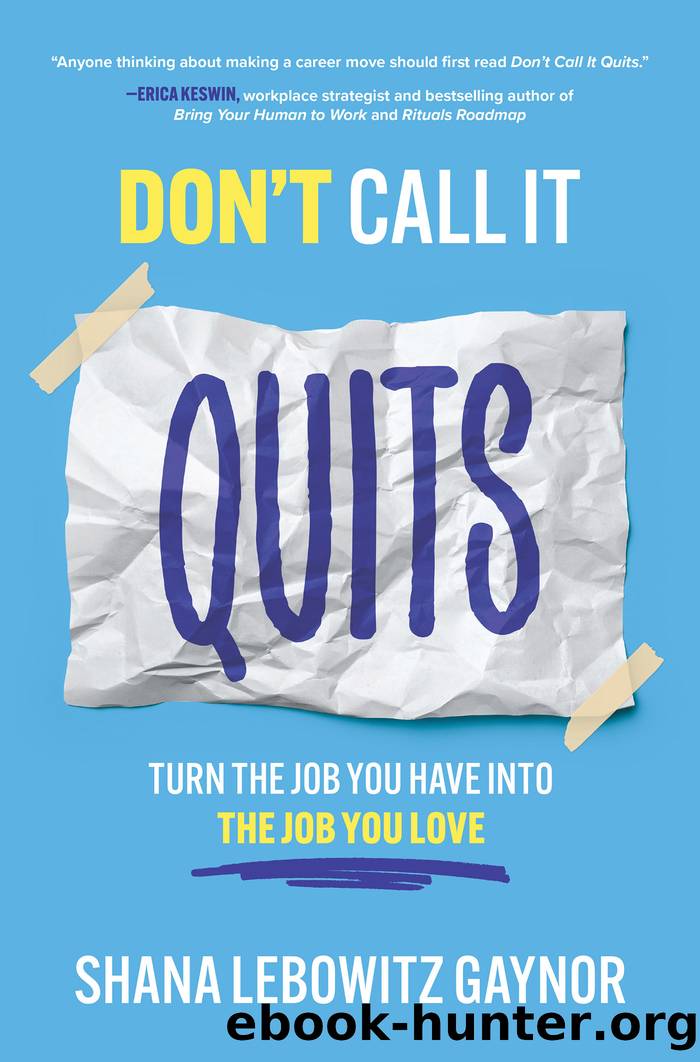Don't Call It Quits by Shana Lebowitz Gaynor

Author:Shana Lebowitz Gaynor
Language: eng
Format: epub
Publisher: McGraw Hill LLC
Published: 2022-12-15T00:00:00+00:00
FOCUS ON YOUR LEARNING AND DEVELOPMENT
Wisdom like Carterâsâplay great music even if your ship is sinking; find something about the job that resonates with youâcomes in handy wherever you are in your career right now. You could, theoretically, resign yourself to the possibility that your career is currently on hold because you hate your job and arenât growing in it. In this universe, youâre essentially biding your time until you can leave.
Or you could do what you can to develop your skills given the circumstances.
In part this might mean seeking out new projects and leadership opportunities at your company. It might also involve a bit of a mindset shift, so that every day you remind yourself that the work youâre doing now will open up better career opportunities down the road. Carter was a more attractive candidate to Patagonia because of the impactful work heâd done at Sears. Youâll be more appealing to your dream employer, too.
I talked with Jessie Wisdom, a former Google people analytics manager who cofounded the HR software platform Humu, about how exactly to make this mindset shift. Humu helps employers like sweetgreen and Virgin Atlantic improve their performance and their employee engagement by sending managers and individual contributors ânudgesâ toward positive behavior changes. (For example, âTell a colleague you appreciate their work.â)3
Yet Wisdom is also aware that not all workers at every organization are ecstatic about the work theyâre doing or are planning to stay there forever. To workers who feel understimulated or unfulfilled by their jobs, Wisdom says, âMaybe thereâs something thatâs at least useful to your long-term learning and career prospects.â In other words, even if the job responsibilities themselves donât change (or donât change much), your focus shifts to your own learning and development.
To use her example, say you work in a call center and find the job somewhat dull. Instead of allowing that perception to envelop the entire workday, see if you can identify one or two skills that youâre developing in this job that will help you get your next job, one you really want.
That skill could be influence: As you try to persuade people to buy the product or service youâre selling, think about how youâre building a muscle that will come in handy whether you pursue a career in sales, marketing, or really any field that involves interacting with other people. Or say you work in consulting and regularly give presentations to other teams about your research. In this case, learning how to craft a compelling pitch will benefit you if ultimately you decide to pursue something more entrepreneurial.
Focusing on skills and tasks that enhance your career development is a good idea in any job, but particularly if youâre unhappy and feel stuck in your current role.
These types of competenciesâwhich map easily from one job or career to the nextâare called âtransferable skills.â Being able to identify and articulate your transferable skills is critical in making a career transition, especially if youâre aiming to switch industries (as opposed to switching companies in the same field).
Download
This site does not store any files on its server. We only index and link to content provided by other sites. Please contact the content providers to delete copyright contents if any and email us, we'll remove relevant links or contents immediately.
Zero to IPO: Over $1 Trillion of Actionable Advice from the World's Most Successful Entrepreneurs by Frederic Kerrest(4499)
Machine Learning at Scale with H2O by Gregory Keys | David Whiting(4290)
Never by Ken Follett(3931)
Harry Potter and the Goblet Of Fire by J.K. Rowling(3843)
Ogilvy on Advertising by David Ogilvy(3598)
Shadow of Night by Deborah Harkness(3356)
The Man Who Died Twice by Richard Osman(3067)
Book of Life by Deborah Harkness(2928)
The Tipping Point by Malcolm Gladwell(2909)
Will by Will Smith(2904)
0041152001443424520 .pdf by Unknown(2843)
My Brilliant Friend by Elena Ferrante(2822)
Purple Hibiscus by Chimamanda Ngozi Adichie(2811)
How Proust Can Change Your Life by Alain De Botton(2801)
How to Pay Zero Taxes, 2018 by Jeff A. Schnepper(2643)
Hooked: A Dark, Contemporary Romance (Never After Series) by Emily McIntire(2544)
Rationality by Steven Pinker(2349)
Can't Hurt Me: Master Your Mind and Defy the Odds - Clean Edition by David Goggins(2319)
Borders by unknow(2301)
